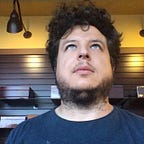What Time Will Not Dim
A Visit to Normandy Beach
I choked back tears twice. It was the words that got to me. At several locations around the memorial, quotes were finely etched into the wall. One spoke of the “proof” that America was not in the war for “conquest.” It spoke of a purity of purpose that was beautiful, transcendent. But cynicism immediately suggested to me that we’ve drifted from this purity.
Though I hurried through the memorial, trying to find the rest of my group, I did pause at a few of the exhibits. There was a first aid kit on display — a green square canvas pouch. Its contents were adroitly packaged and designed to fit inside with tetris-like precision. Every piece of the kit was well-labeled, so that you didn’t have to think too hard when it came time to use it. I thought about the confusion of battle, and how easy it would be to screw something up, how easy it would be to panic. Maybe it wouldn’t always be a medic using the supplies. That situation comes up a lot in war movies.
I also saw a model layout of the fortifications Rommel had built on the beach. He erected four rows of vehicle-stopping barriers, like hurdles which the Allies could not jump. They, unfortunately, would have to go on foot. He also flooded some areas further inland to make them less accessible. Overall, he appeared a competent strategist, prepared for the invasion. I took a picture of one of the artillery bunkers. It was a large concrete mass, full of holes; but it had an immensity to it, and echoes of a stylized, art deco feel. Maybe like something out of Lang’s Metropolis.
In the end, Rommel was not some soft, over-confident, easy-to-knock-over bad guy. The movies lie to us, sometimes.
As I passed through a hallway into another room of the memorial, a woman with a steady, plain, unaccented voice read out the names of those who had died, pausing a second or two between each one. Halfway through, I heard her call my namesake, Parker. I remember thinking, before entering the hall: what if she calls my name? To have it actually happen, though, left me wondering. I know my dad’s father had been in the military, but I never knew him. He couldn’t have been in the war, since he was probably only eight or nine when it started. I had no inkling that there were any of my family who had fought in WWII, or who had stormed the beaches of Normandy. Surely, that would be a story we would tell.
As I exited the memorial building, another quote caused me to wrestle with my jaded thoughts. Translated, it read, “we have not forgotten, we will never forget.” The French president’s words were evidence that we had done something worthwhile, something that deserved to be remembered. Nothing else that has transpired since then can negate that fact: we stood together and made a brave declaration to pit our lives against a dark threat of evil. Pride welled up in me, because our nation rose into action. I wonder now what I must do now, what I should say, so that “time will not dim the glory of their deeds.”
I went down to Normandy beach. It was the place where others picked up stones as keepsakes. I picked up some sand, rubbed my hands together. I wanted to touch their courage, to absorb it. I wanted to be a part of it, somehow. Water rushed in and wet my shoes, so I tucked them into the sand and let it stick. It was soft and powdery, and I would take it with me. I imagined what it would be like to storm that beach, lugging a 15 pound rifle, whose discharge was probably loud and jarring, deranging the senses even more on that day. Chugging sand on that day when a full measure of apocalyptic violence was poured out. But now the place was peaceful, isolated, serene, beautiful. There were gardens of green growing things all down the hill — all the way to the beachfront. It was as if the place had seen enough of struggle and was given over to silence and quiet reflection.
